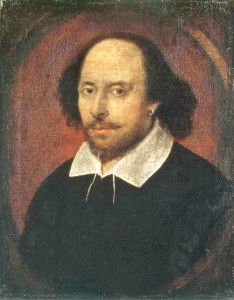William Shakespeare, the English language’s greatest writer and the world’s greatest playwright, died 400 years ago on 23rd April 1616, aged 52. Shakespeare grew up in Stratford-upon-Avon. He moved to London in his early twenties, making a successful 30-year career as an actor, writer and part owner of a drama company. His greatest plays – Hamlet, Othello, King Lear and Macbeth – are considered some of the finest works in the English language.
Shakespeare returned to Stratford in 1613, dying three years later. The words on his grave in the chancel of Holy Trinity Church set a curse on ‘he that moves my bones,’ something carefully avoided when the church was renovated in 2008. Little is known of Shakespeare’s private life, prompting wild speculation about everything from his physical appearance to his religious beliefs and more recently, in line with modern concerns, his sexuality.
Was Shakespeare a Christian? There has certainly been speculation about his personal religious beliefs, particularly about whether he was truly Protestant. Some scholars want him to be Catholic. And of course some scholars of this post-Christian era want him to be an atheist. Whether Shakespeare was a Christian was a question people in Elizabethan England would not ask. People considered themselves born Christian. English society was a Christian society. It was not perfect but people naturally grew up accepting the beliefs of their parents and community.
Queen Elizabeth’s Religious Settlement Acts, while not totally removing the old Catholic versus Protestant hostilities, put them underground, as much by the length of her reign as the compromises of her laws. Sunday Church attendance was compulsory and that church was Elizabeth’s Church of England with her as its head. With Elizabeth on the throne before Shakespeare’s birth, and reigning most of his life, that was the England in which he was born and lived.
There is not the slightest doubt that Shakespeare would have believed that he was a Christian. He attended church with his parents from an early age and was educated at Kings New School in Stratford. The curriculum was based on Latin and reading the Latin authors from which Shakespeare quoted liberally in his plays. With strict Christian teaching, pupils learned key Bible verses by heart, memorised creeds and catechisms and took part in daily Christian liturgies.
Shakespeare attended church. Cynics say he had no choice, as do those who want him to be secretly Catholic. But there is ample evidence in the plays that he knew and appreciated the Book of Common Prayer. The words of the Church of England services appear throughout his plays and the impression is that he took an intelligent interest in the words and enjoyed his familiarity with the liturgy.
This is even more true of the Bible. Biblical stories and allusions were a rich source for him. A thoughtful reader with Bible knowledge will sense in Shakespeare’s plays far more than mere forced familiarity with the Bible but a genuine love of it. The plays contain over 1,000 conscious uses of Scripture and many other unconscious uses of Biblical words by a person who loved and read the Bible.
Shakespeare heard the Bishops Bible read in church and clearly quoted its phrases. But he used the Geneva version most, not a church version but one people themselves could own. It is abundantly clear from Shakespeare’s plays that he owned and read his own Geneva Bible. To Shakespeare, his beloved Bible was a major source of imagery – for drama, pathos, tragedy or humour. He used the Bible brilliantly with the ease of a person totally familiar with it.
Email This Story
Why not send this to a friend?
